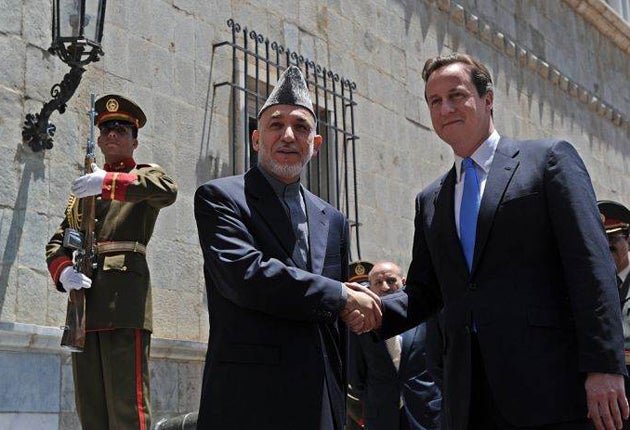Cameron offers cash – but not troops – to help fight the Taliban

David Cameron offered extra funds to combat roadside bombs taking a relentless toll on British lives during his first visit to Afghanistan as Prime Minister yesterday, but ruled out sending any extra troops to help turn the tide of the war against the Taliban.
Mr Cameron's declaration that sending reinforcements was "not remotely" on the agenda and that the question should be "Can we go further, can we go faster?" on the date of withdrawing troops showed a desire to disengage from the conflict as soon as possible. In the meantime, however, he stated that a further £67m will be spent on countering IEDs (improvised explosive devices) on top of £150m pledged by Gordon Brown during his own visit to Afghanistan last year when he was still prime minister.
The issue of IEDs has been given added sensitivity following the resignation of Colonel Bob Seddon, the head of the Army's bomb disposal squads, last month, over concerns about the pressure being faced by his men in tackling what has become the insurgents' weapon of choice.
The new funds will be spent on doubling the number of counter-IED teams to 20, up to 13 new Mastiff armoured vehicles and Dragon Runner robots used to track the bombs. In addition, £200m will be diverted from the existing international development budget for reconstruction work in Helmand. Other measures included an "information sharing" initiative under which the Foreign Secretary, William Hague, and the Defence Secretary, Liam Fox, will make quarterly "situation reports" to the Commons.
Mr Cameron arrived in Afghanistan the morning after a suicide bomber killed 40 people and injured 70 others at a wedding ceremony near Kandahar. He also came at a particularly bloody period in the conflict during which 29 Nato soldiers, including Britons, had died in a month.
Part of his Afghan tour was re-routed after the military intercepted calls suggesting insurgents planned to shoot down his helicopter, an aide said.
Mr Cameron had visited an agricultural college in Helmand and was scheduled to continue to the Shahzad military patrol base, but that excursion was called off by the Brigadier Richard Felton, the British commander. Still airborne, the Prime Minister's Chinook was diverted to the provincial capital of Lashkar Gah, where Mr Cameron had a barbecue with troops.
At a press conference in Kabul with the Afghan President Hamid Karzai, Mr Cameron was careful to highlight what he claimed to see as signs of progress after Dr Fox had described the country as a "broken 13th-century state". The Prime Minister stressed that Afghanistan was the "most important foreign policy issue, the most important national security issue facing our country, and it is that national security approach I want to stress here today".
But he also stressed that the focus should be on ending the deployment of the British force saying: "We should all the time be asking: can we go further, can we go faster? Nobody wants British troops to be in Afghanistan a moment longer than is necessary. The President doesn't, the Afghan people don't, the British people don't."
Mr Cameron stated there should be a political solution to the conflict, saying he welcomed last week's public meeting in Kabul at which Mr Karzai discussed proposals to encourage elements of the Taliban to rejoin the political mainstream. However, the overtures to the insurgents by the Afghan President, and the freeing of prisoners had alarmed a number of senior officials and human rights groups.
Mr Karzai's appeasement policy was said to be one of the main factors which drove Amrullah Saleh, the head of the intelligence service, the National Directorate of Security, and Hanif Atmar, the Interior Minister, to resign from the government. The departure of the two men, seen as honest and effective, is seen as a major blow by the West. The US Defence Secretary Robert Gates said during a visit to London that he "only hoped" that Mr Karzai would "replace them with equally able people". Mr Gates also warned that the public in the West would want to see discernible signs of progress by the end of year.
Join our commenting forum
Join thought-provoking conversations, follow other Independent readers and see their replies
Comments
Bookmark popover
Removed from bookmarks